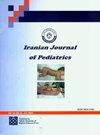Dose Hydrocele in Children Caused by Ventriculoperitoneal Shunt Migration Always Need Surgical Intervention? Watch and Wait - A Rare Cause of Hydrocele
IF 0.4
4区 医学
Q4 PEDIATRICS
引用次数: 0
Abstract
Introduction: Ventriculoperitoneal (V-P) shunt is a common surgery for pediatric patients with hydrocephalus. Migration of the shunt to the scrotum is rare. Its clinical presentation may be silent if the shunt keeps patent. We describe such a case following the implantation of a V-P shunt with scrotal migration, with the tip still kept in the peritoneal cavity with patent function. We will discuss this rare complication and review the literature. Case Presentation: A 28-week-old boy presented preterm-related spontaneous intraventricular hemorrhage and hydrocephalus. The patient underwent surgery via V-P shunt implantation. One month after the operation, V-P shunt migration with the right hydrocele was diagnosed while the tip was still in the peritoneal cavity with a patent function. We adopted a watch-and-wait approach in which outpatient follow-up would be continued until the patient was 1.5 years old, when we would decide whether to perform hydrocele repair and correct the drainage tube malposition or continue follow-up. The patient was alert with good activity and close follow-up. Conclusions: Ventriculoperitoneal shunt migration with hydrocele in young children is a rare complication after the surgery. Regular follow-up up to 1.5 years old is recommended for patients with the tip in the peritoneal cavity and patent shunt function. Surgical intervention is suggested for cases with tip in the scrotum, shunt kinking, remarkable hydrocele, or hydrocephalus progression. Although V-P shunt migration is uncommon, we should take care of it to find out and solve the problem.脑室-腹膜分流迁移引起的儿童鞘膜积液是否一定需要手术干预?观察和等待-鞘膜积液的罕见原因
脑室-腹膜(V-P)分流术是儿科脑积水患者的常见手术。转移到阴囊是罕见的。如果分流器保持专利,其临床表现可能是沉默的。我们描述了这样一个病例,在植入一个阴囊迁移的V-P分流器后,其尖端仍然保留在腹膜腔中,具有专利功能。我们将讨论这种罕见的并发症并回顾文献。病例介绍:一个28周大的男孩表现出早产相关的自发性脑室内出血和脑积水。患者通过V-P分流植入手术。术后1个月确诊V-P分流伴右侧鞘膜积液,其尖端仍在腹膜腔内,功能通畅。我们采取观察等待的方式,继续门诊随访,直到患者1.5岁,再决定是否进行鞘膜积液修复和纠正引流管错位或继续随访。患者神志清醒,活动良好,随访密切。结论:小儿脑室-腹膜分流移位合并鞘膜积液是一种少见的术后并发症。对于尖端位于腹腔且分流功能未闭的患者,建议定期随访至1.5岁。对于有阴囊尖端、分流扭结、明显的鞘膜积液或脑积水进展的病例,建议手术干预。虽然V-P分流不常见,但我们应该注意发现并解决问题。
本文章由计算机程序翻译,如有差异,请以英文原文为准。
求助全文
约1分钟内获得全文
求助全文
来源期刊
CiteScore
0.90
自引率
20.00%
发文量
75
审稿时长
6-12 weeks
期刊介绍:
Iranian Journal of Pediatrics (Iran J Pediatr) is a peer-reviewed medical publication. The purpose of Iran J Pediatr is to increase knowledge, stimulate research in all fields of Pediatrics, and promote better management of pediatric patients. To achieve the goals, the journal publishes basic, biomedical, and clinical investigations on prevalent diseases relevant to pediatrics. The acceptance criteria for all papers are the quality and originality of the research and their significance to our readership. Except where otherwise stated, manuscripts are peer-reviewed by minimum three anonymous reviewers. The Editorial Board reserves the right to refuse any material for publication and advises that authors should retain copies of submitted manuscripts and correspondence as the material cannot be returned. Final acceptance or rejection rests with the Editors.

 求助内容:
求助内容: 应助结果提醒方式:
应助结果提醒方式:


